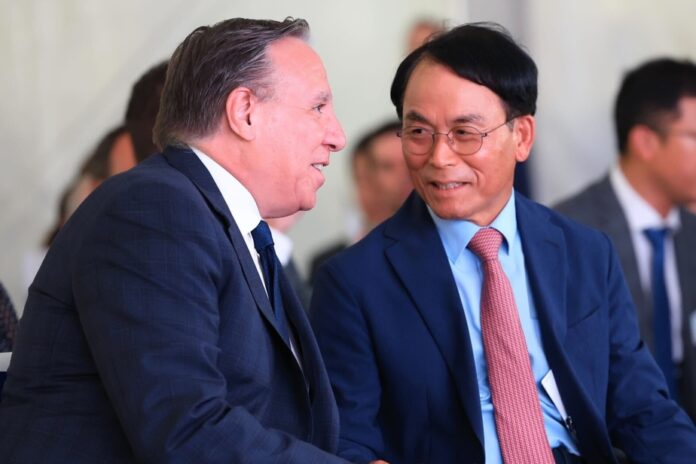(Granby) Quebec and Ottawa have not hesitated to enter the race for subsidies to seduce players in the battery sector, an approach that is not unanimous. “We don’t give freebies to anyone,” retorts Premier François Legault, saying those who claim otherwise are engaging in “petty politics.”
Annoyed by this question, Mr. Legault chose to broach the subject himself by confirming the arrival of Volta Canada Energy Solutions in Granby on Tuesday during a large-scale press conference bringing together representatives of the three orders. of government.
Estimated at $750 million, this project is financially supported by a forgivable loan of $150 million from the Legault government and up to $70 million from the Trudeau government. It will lead to the creation of 260 jobs.
“I’ve heard things that bother me a little bit,” Mr. Legault said during his speech. Each time the government gives assistance to a company, we ensure that the benefits for Quebecers exceed this amount of assistance. You have to understand that the manufacturing sector, its repositioning is currently being played out. To think that it would be a good idea to do nothing and wait, I think that would be a mistake. »
The premier’s outing comes less than three weeks after Ford was awarded financial assistance to convince the automaker and its partners to build a plant for cathode materials – one of the main battery elements that the found in electric vehicles – in Bécancour.
In a few weeks, Quebec and Ottawa should release the checkbook once again when the Northvolt cell manufacturer confirms a project of approximately 7 billion on the South Shore of Montreal.
During his speech, François Legault refrained from naming the people targeted by his remarks. In a press briefing, however, he went further by quoting Québec solidaire (QS) and his co-spokesperson Gabriel Nadeau-Dubois.
“[They] are very fond of saying we shouldn’t help the nasty rich corporations,” Legault said. Except that if we give a dollar to a company as we do today and that it brings in Quebecers, we are winners and we make sure to have jobs of the future here for our young people. »
Alongside his Minister of Economy, Innovation and Energy, Pierre Fitzgibbon, and Federal Minister of Innovation, Science and Industry, François-Philippe Champagne, Mr. Legault however, had no specific fallout to quantify when he was asked if he could offer a portrait.
Recalling that places like the United States and Europe offer even more generous subsidies, Mr. Champagne took the plunge. He agreed with Mr. Legault, arguing that the battery industry is still in its infancy and that it will take time to measure the extent of the fallout.
“We are creating a new industry like we had the pulp and paper industry, the aluminum industry and bio-manufacturing,” said the federal minister. We are building the future. We cannot make an equation over five to ten years. »
In the Granby industrial park, Volta Energy Solutions, owned by the South Korean group Solus Advanced Materials, will produce copper sheets. They go into making the anode, the negative pole of the lithium-ion battery. This will be the first facility of its kind in Canada.
Production should start around 2026. The plant will then produce 25,000 tonnes of copper sheets annually. It will double its production the following year with the addition of a second building to reach 63,000 tons per year. This is expected to produce some of the materials needed for 2.5 million vehicles each year.
President of Solus Advanced Materials and Volta Energy Solutions, Daeje Chin also defended the financial assistance offered to his company. In English, he explained that the money would be used to absorb construction costs and that the arrival of the multinational would attract other companies in the same niche to the region.
“You have to believe in them,” Mr. Chin said, referring to Messrs. Legault, Fitzgibbon and Champagne. They are good partners. We could have gone everywhere, like in the United States. But there were important elements for us here. »
In Granby, Solus bought out a plant that once produced copper foil for the printed circuit board market. The building is already built and some of the equipment can be reused. This speeds up the process.
Mr. Chin also touted the hydroelectricity supply. In Hungary, where Solus also operates a copper foil plant, fluctuating prices for natural gas – the energy used to power the facilities – due to Russia’s invasion of Ukraine have sometimes increased the price of the energy bill, he said.















